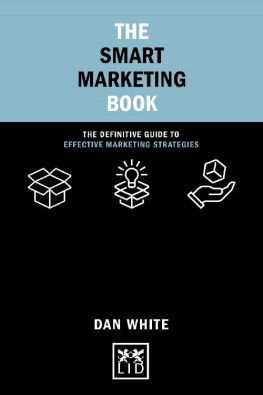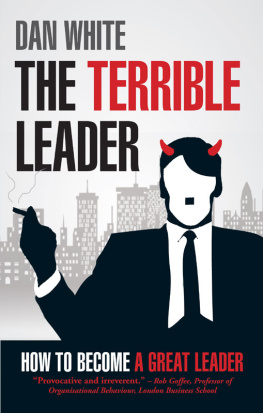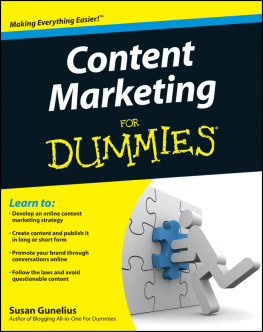

PRAISE FOR
THE SMART
MARKETING BOOK
With engaging visual mnemonics and clear, to the point copy,
Dan White has demonstrated that he is a master of the art
of making things simple in this useful little book.
Chuck Young, CEO, Ameritest
The Smart Marketing Book is everything it sets out to be:
an intelligent, comprehensive and clear review of marketing
principles, each one supported by a unique summary image.
Nigel Hollis, Chief Global Brand Analyst, Kantar
Very clearly structured and written, with new ways of
presenting novel but also some well-known concepts,
using witty and stylish drawings.
Dimitri Pisarsky, MD, Millward Brown A/R/M/I Marketing
Dan Whites The Smart Marketing Book is a perfect read for anyone
entering their first role. Actually, its a good read for more practiced
marketers too. Read it youll pick up something new, for sure.
Duncan MacConnol, Joint Managing Director, Quantic
I no longer have the time to pull out trusty copies of Kotler,
Reis or Covey and the fast-food reductiveness of many modern
models either leaves me cold or none the wiser as to their
practical application. [This book] is appropriately sophisticated
for our complex times, while somehow retaining an immediacy
and pragmatism that makes me feel smarter.
Cliff Nichols, National Head of Insights and Marketing, Cox Architecture
A helpful and informative book that (literally!) illustrates
key business, marketing and consumer principles clearly
A great introduction for anyone new to marketing, but equally,
a valuable reminder and prompt for the more experienced
business reader too.
Charlotte May, Group Head of Customer Research, Legal & General
The Smart Marketing Book is a concentrated journey in
how to practically solve an array of marketing puzzles.
Dan never pretends to have all the answers. Rather, he brings
wisdom and seeks to equip marketers with proven tools to
help them make better day-to-day decisions.
Tim Wragg, CEO, North America Kantar
This is a great book its a distillation of a careers worth of
learning into something even a newcomer can understand.
David Chantrey, Transformation Director, Kantar
I wish this book had been around when I was coming
through the ranks.
Richard Clissold-Vasey, Transformation Director, Kantar
FOR OTHER TITLES
IN THE SERIES...

CLEVER CONTENT, DYNAMIC IDEAS, PRACTICAL
SOLUTIONS AND ENGAGING VISUALS
A CATALYST TO INSPIRE NEW WAYS OF THINKING
AND PROBLEM-SOLVING IN A COMPLEX WORLD
conciseadvicelab.com
THE
SMART
MARKETING
BOOK
THE DEFINITIVE GUIDE TO
EFFECTIVE MARKETING STRATEGIES
DAN WHITE

CONTENTS
INTRODUCTION
Marketing is an exciting, dynamic profession requiring an unparalleled breadth of knowledge, technical understanding and creativity. Psychological discoveries and new technologies create a continual flow of marketing opportunities. With these innovations, however, come risks and considerable confusion. Marketers can feel overwhelmed by all the complexity and the new ideas they are expected to assimilate. Most marketing books add to the mental log jam by exploring a novel perspective in detail without explaining how it relates to established marketing principles. Successive fads lead marketers to hone their craft in one area at the expense of others. Few marketers have time to read overly specialist books that ignore the bigger picture.
The Smart Marketing Book is different. It brings together old and new marketing thinking, explaining in clear, succinct terms how everything connects and how it can be applied in day-to-day decisionmaking. Technologies and business models might be in a constant state of flux, but the workings of the brain evolve slowly. This book equips marketers with the principles and concepts they need to assimilate the new and navigate the industrys complexity with confidence.
The following ten chapters cover different aspects of marketing. Each chapter stands alone, but newcomers to the profession will find it easier to build up their knowledge by reading them in order. Ideas are conveyed in clear, accessible language, supported by frameworks some old, some new and brought to life by unique visualizations. The goal is for the reader to take in complex ideas with ease and become confident applying them.
The Smart Marketing Book is an indispensable guide for anyone who has taken on the fascinating challenge of building a career in marketing.
PART ONE

MARKETING
1.1 HOW BUSINESSES
MAKE MONEY
Since most businesses exist to make money for their owners, they need to provide better returns than alternatives such as government bonds, which offer low risk and guaranteed returns. In the past few decades, bonds have yielded between 2% and 5% per year, which explains why businesses usually aim to deliver a profit significantly greater than this, often 10% or more.
The finances of a company work in the same way as those of a household. If you have more revenue coming in than costs going out, you make a profit and start accumulating cash. In business, this cash either goes to the owners/shareholders or its invested in the business to maximize future profits.
HOW BUSINESSES MAKE MONEY

Revenues depend on the volume of products or services sold, the price at which theyre sold, and any royalties received from partners selling the companys offer under licence.
Costs can arise from the need for buildings, materials, equipment and software, as well as the expense of hiring, training and paying employees. There may also be costs from transporting goods to retailers and advertising used to stimulate sales. Most companies also have ongoing costs for developing new and improved products and services required to keep the companys offer competitive.
1.2 PURPOSE OF MARKETING
There is no universal definition of marketing. It can refer to both the money-making approach adopted by a business as well as a responsibility within a business for governing the approach. In keeping with its ethos, ,The Smart Marketing Books definition is a succinct one:
To create, promote and deliver products or services that enable commercial objectives to be met through the customer value they generate.
This definition emphasizes marketings responsibility for balancing the businesss need to make a profit with the need for customers to be happy with what they receive for the money they pay. Effective marketing involves creating value that benefits the customer and the business.

















